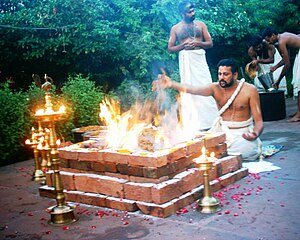
Back Yajna Afrikaans ياجنا Arabic যজ্ঞ Assamese Yajna BCL Яджна Bulgarian यज्ञ Bihari যজ্ঞ Bengali/Bangla Γιάζνα Greek Yajña Spanish Yajña Basque

| Part of a series on |
| Hinduism |
|---|
 |

Yajna or Yagna (Sanskrit: यज्ञ, lit. 'act of devotion, worship, offering in fire', IAST: yajña) also known as Hawan in Hinduism refers to any ritual done in front of a sacred fire, often with mantras.[1] Yajna has been a Vedic tradition, described in a layer of Vedic literature called Brahmanas, as well as Yajurveda.[2] The tradition has evolved from offering oblations and libations into sacred fire to symbolic offerings in the presence of sacred fire (Agni).[1]
Yajna rituals-related texts have been called the Karma-kanda (ritual works) portion of the Vedic literature, in contrast to the Jnana-kanda (knowledge) portion found in the Vedic Upanishads. The proper completion of Yajna-like rituals was the focus of Mimansa school of Hindu philosophy.[3] Yajna have continued to play a central role in a Hindu's rites of passage, such as weddings.[4] Modern major Hindu temple ceremonies, Hindu community celebrations, or monastic initiations may also include Vedic Yajna rites, or alternatively be based on Agamic rituals.
- ^ a b Nigal 1986, p. 80-81.
- ^ Laurie Patton (2005), The Hindu World (Editors: Sushil Mittal, Gene Thursby), Routledge, ISBN 978-0415772273, pages 38–39
- ^ Randall Collins (1998), The Sociology of Philosophies, Harvard University Press, ISBN 978-0674001879, page 248
- ^ Cite error: The named reference
rjb1969was invoked but never defined (see the help page).